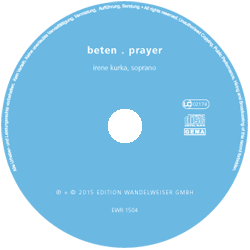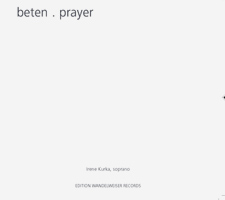EDITION WANDELWEISER RECORDS
> CD catalogue
>> Irene Kurka
_____________________________________________________________________
<< >>
beten . prayer
| order
reference:
medium: composer: performer: |
EWR
1504 CD Antoine Beuger, James Weeks, Dante Boon, Sidney Corbett, Dante Boon, Nikolaus Brass, Eva-Maria Houben Irene Kurka (soprano) |
 |
 |
>> musica sacra >> the wire >> the rambler (blog)
Sidney Corbett Gebet Gebet (Prayer) was composed in 1999 and was premiered in August of that year in Frankfurt (incidentally on the day of a complete solar eclipse). The text is drawn from "The Mystical Theology" by a 5th century Syrian monk now known as Pseudo-Dionysios Areopagita. Mistaken for St. Paul's first convert, his texts were seen in the Middle Ages as quasi apostolic, thus they became extremely widespread although much of the content, which centers on the "Deus Absconditus", could easily have been seen as heretical. Dionysios’ view of God as the absence of any conceivable attribute born from human imagination is very close to some medieval kabbalistic concepts. Also Dionysios Areopagita's texts were the source of the Catholic mysticism of Meister Eckhart and others. Text from: Pseudo-Dionysios Areopagita, Die göttliche Dunkelheit O Dunkel des Schweigens, Es wäre nicht genug, von dir zu sagen, daß du vor lauter Finsternis In strahlendstem Licht aufglänzest, nicht genug, von dir zu glauben, dass dein Glanz sich immer gleich bleibe, unstörbar und unzerstörbar, nie zu sehen und nie zu erreichen. Es wäre auch nicht genug, von dir zu sagen, dass du, Dunkelheit des Urgrunds, jenen vollkommenen Geist, der die Augen des Daseins und die Augen des Seins zu schließen vermöchte, mit der Leuchtkraft deiner Fülle, bis zum Bersten blendest und schöner bist als die Schönheit selbst. Dies ist mein Gebet. Amen. (Übersetzung von Prof. Dr. Walther Tritsch) O Darkness of Silence It would not be enough to say of you that you in your absolute darkness shine in the most radiant light, not enough, to believe of you that your radiance always remains the same, imperturbable and indestructible, never to be seen and ever beyond reach. It would also not be enough to say of you, that you, darkness of the primordial ground, completely perfected spirit, able to close the eyes of presence and the eyes of existence, with the luminosity of your plenitude blinds to the bursting point and that you are more beautiful than beauty itself. This is my prayer. Amen. (Translation: Sidney Corbett) Dante Boon Mirte Text from: Johannes vom Kreuz - Der Geistliche Gesang (El Cantico Espiritual) Wo hast du dich verborgen, Liebster, und lieβest seufzend mich zurück hier. Bist wie der Hirsch entflohen, nachdem du mich verwundet, ich lief dir nach und schrie – du warst verschwunden. Ihr Hirten, die ihr weilet dort oben bei den Hürden zu den Höhen, wenn ihr vielleicht ihn sehet, den ich so innig liebe, dann sagt ihm, ich bin krank, ich leide, sterbe. Nach meiner Liebe suchend geh‘ ich durch diese Berge und Gestade, ich pflücke keine Blumen, ich fürchte keine Tiere und jede Grenze werde ich passieren. (Übersetzung: Antoine Beuger) Where have you hidden, Beloved, and left me moaning? you fled like the stag after wounding me; I went out calling you, but you were gone. Shepherds, you who go up through the sheepfolds to the hill, if by chance you see him I love most, tell him I am sick, I suffer, and I die. Seeking my Love I will head for the mountains and for watersides, I will not gather flowers, nor fear wild beasts; I will go beyond strong men and frontiers. (translation: Kieran Kavanaugh OCD and Otilio Rodriguez OCD copyright ICS Publications) James Weeks: …Prayer is The World in tune… Henry Vaughan’s idea (1650) of praying being a process of ‘tuning oneself in’ is reflected in the lines from Pessoa that are incorporated into the piece: May this always be my life: The day bright with sunshine or mild with rain, Or stormy as if the world would drown… To feel life flowing through me like a river over its bed, And outside a great silence, like a sleeping god. The piece exclusively uses intervals formed between some of the first eleven partials of the harmonic series, and so performs its own kind of tuning-in. Eva-Maria Houben: a-men "halleluja" – "ja" – "a" – "a-men": a short prayer – praising the Lord and giving thanks. It is an affirmation of life, creation and our temporal existence. I become subsumed in the recitation of 'ja' (German: 'yes') letting myself go trusting that I will be carried. In forming the word 'ja' the mouth opens as if to cry out. |